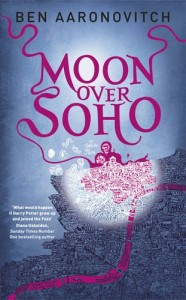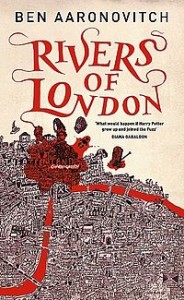 Having read Rivers of London, not going straight on to Moon over Soho was an impossibility, so I did, disregarding all other plans for January reading (the two books appearing between this one and Rivers of London were actually read in 2013).
Having read Rivers of London, not going straight on to Moon over Soho was an impossibility, so I did, disregarding all other plans for January reading (the two books appearing between this one and Rivers of London were actually read in 2013).
At the novel’s start, PC Peter Grant is back to his regular training programme at The Folly, and Lesley is at her parents’ house, recuperating. Peter goes to visit, driving from London:
At the end of the road lay Brightlingsea, lining the coast – so Lesley had always told me – like a collection of rubbish stranded at the high-water mark.
I keep loving the way Aaronovitch uses language and the impossibly charming hate-love relationship with London and Britain he displays. Not to mention the cultural references:
At this very moment astronomers are detecting planets around distant stars by measuring how much their orbits wibble, and the clever people at CERN are smashing particles together in the hope that Doctor Who will turn up and tell them to stop.
Aaronovitch is also conversant in corporate newspeak:
‘Are you SIO on this, ma’am?’ I asked. The Senior Investigating Officer on a serious crime was usually at the very least a detective inspector, not a sergeant. ‘Of course not,’ said Stephanopoulos. ‘We have a DCI on loan from Havering CID, but he’s adopted a loose collaborative management approach in which experienced officers undertake a lead role in areas where they have the greatest expertise.’ In other words, he’d locked himself in his office and let Stephanopoulos get on with it. ‘It’s always gratifying to see senior officers adopting a forward-looking posture in their vertical relationships,’ I said, and was rewarded by something that was almost a smile.
He is also not afraid to call out institutionalized and internalized racism:
Outside the big cities, my very appearance can sometimes be enough to render certain people speechless. So it was with Harold Postmartin, D.Phil, FRS, Curator of Special Collections at the Bodleian Library, who had clearly been expecting Nightingale to introduce someone ‘different’ as the new apprentice. I could see him trying to parse the phrase but he’s coloured in a way that wouldn’t cause offence, and failing. I put him out of his misery by shaking his hand; my rule of thumb is that if they don’t physically flinch from touching you, then eventually they’ll make the adjustment.
Ok. Enough of the quoting (I think). I’m just trying to show why the books are such a joy to read. The plot is good, too, but it’s hard to say too much without major spoilers, and so I’ll refrain. If you’re not interested in reading the book, a synopsis would be no use to you, and if you are you don’t want the plot spoiled.
The one negative thing I have to say is that the novel could have used a continuity check, preferably one that aligned with Rivers of London. There are some odd incongruities, most so vague that it’s hard to put your finger on what feels wrong, and some cases of things being explained in the wrong order, so to say. A fact being presented in such a way that you feel you must have missed a connection piece of narrative, only for that connecting piece to show up a little later. It may even be deliberate, but it dosn’t work. Not for me, anyway.
However, on the whole the books are so good that it’s easy to forgive the few flaws. Now on to Whispers Underground!
